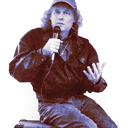I’ve been having problems with my computer mouse for the last two days. The mouse can no longer be entirely relied upon to click when I press the button or to unclick at the right time when I release it. This can cause obvious problems when I’m working on the computer, especially if I drag an item to the wrong place on the screen or select the wrong menu item because the mouse button is balking. Ideally, such a mouse should be replaced immediately, but to save myself the expense of a shopping trip, I’ve decided to live with the problem for two weeks while I order a new one and have it delivered.
You adapt quickly and unconsciously to the circumstances you are working in. Under the influence of a balky mouse, I find that I am doing more writing. I do writing mostly with the computer keyboard, without relying too much on the mouse, so my writing work isn’t deterred by a mouse that isn’t quite working.
At the same time, I find that I am neglecting my email and editing work, both of which rely heavily on the mouse. When I try to do things like email and editing with a mouse that isn’t quite working, I find the mouse button problem frustrating and I don’t tend to stay at it for more than a few minutes.
I am telling you this story not to urge you to fix your balky computer mouse if you have one, but as an illustration of how much a person’s way of working can be influenced by their circumstances. Yesterday and today, without meaning to, I find myself doing less of one kind of work and more of another just because of the inconvenience of one small equipment problem. If you look at your work and living environments as a whole, you could discover that your behavior is being shaped by dozens of minor hassles, some of them as small as the button on a computer mouse. If you want to change your behavior, then, you can do so by changing your environment.
This especially works if your level of action in a particular area is less than you want it to be. Perhaps there is work you know you need to do, but you are willing to address it only when you are clear-headed and full of energy. Look at the circumstances of the work you would like to do more of and ask where the hassles are.
Suppose, for example, you want to save money by doing more cooking at home, but when you it comes time to cook, you are too tired to do it. The real problem is not that you are tired — throughout history, tired people have cooked — but that there are too many obstacles surrounding the cooking process. Perhaps you could remove some of the obstacles by rearranging the pots and spoons so that you can find the ones you use most often without having to dig through them. Or it could be something as obvious as cleaning out the refrigerator, throwing away the food you are not actually likely to eat so that you can easily find the ingredients you are looking for. There can be mental obstacles too. For example, if you are always trying to outdo yourself every time you cook a meal, that is a difficult obstacle to overcome. Just thinking about what you will have to do to make your next meal a masterpiece will make you feel tired. Changing your mental approach to your work may be all you need to do to make it easier to do.
The one hassle that you could find in any area of work is clutter. If the materials you want to work with are surrounded by other things that you aren’t using, then just finding the right materials can become a hassle. If you generally aren’t delivering the level of action that you want to have in the important areas of your life or work, the first question to ask yourself is whether you have a pattern of clutter. You may need to take away much of the excess stuff in order to boost your level of action.
This same principle also works in reverse. If there is an action you want to take less of, see what you can do to make that action less convenient for yourself. Suppose, as an example, that you have decided you want to spend less time drinking beer. It might make sense to take the beer out of the refrigerator and put it on a shelf in the basement, or somewhere less convenient. A habit can’t be quite as automatic when you make the actions more complicated for yourself. While you’re at it, also rearrange things to direct yourself toward something you want to do more of. Perhaps you could replace the beer in the refrigerator with something healthier to drink, such as water.
I am taking advantage of my temporary computer mouse problem by catching up on my immediate backlog of writing work, and also by putting a greater emphasis on things I want to do that are away from the computer. Short-term hassles can work to your advantage by shaking up your routine and showing you other ways of approaching things. You don’t want to let hassles become permanent, though, because then they put a damper on your life. Take away the hassles, and it makes it easy to do more.


No comments:
Post a Comment